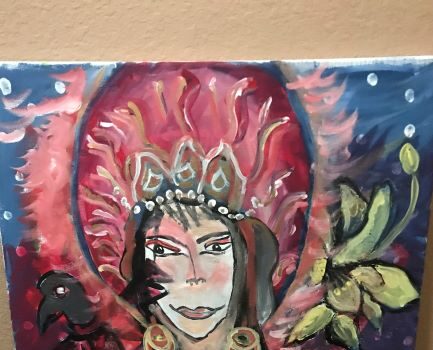Lessons from the Shadows
I continue to be intrigued by the idea of wholeness. Where does wholeness comes from, and how do my shadow selves contribute or detract from my wholeness? My question to myself is “What can I learn from my shadow selves?”
First I have to recognize and name my shadows, which I define as ‘those parts of myself that I do not want to acknowledge.’ While most of us think that our shadows are the ugly parts of ourselves, they can also be the strengths that we don’t want to claim. Our shadows are the parts of ourselves which we developed in childhood. As small children, we counted on those parts of ourselves to help us survive.
As I work with my own shadow self, I have recognized several traits that have both helped me and hurt me in my life. They are perfectionism, the need to be in control, practicality, hyper-responsibility, and fearfulness to be truly seen for who I am.
PERFECTIONISM – Perfectionism leads to the idea that I am never enough. No matter what I do, it isn’t good enough because I can never be perfect. It also puts everything on my shoulders, since no one else can do things right. So I not only set myself up to be not good enough, I set up impossible standards for the people around me. I end up depriving myself of help and support. Then I become resentful and burned out. It is a perfect circular conundrum. On the other hand, perfectionism can drive me to do an excellent job on every task I undertake. Employers love me because whatever I do, I do well. I am rewarded for the very thing that sets me up for burn-out and stress.
CONTROL – I feel the need to be in control of every situation. I have a hard time letting go and allowing others to be in charge. This ties in neatly with perfectionism. Things must be done perfectly, and of course I am the only one who can do things right. When I think I am in control, my anxiety lessens because I think that I can avoid ugly surprises. But of course, control is an illusion. It disallows spontaneity, and it keeps others in a position of inferiority.
I THINK I AM BEGINNING TO SEE A PATTERN HERE.
PRACTICALITY – I see practicality as one of my greatest strengths, but it is also one of my greatest blind spots. Practicality helps me manage money, keeps me from overindulging, keeps me grounded, and helps me to not be envious of others. I pride myself on being practical. However, practicality sometimes allows me to deny my own needs and the needs of others to indulge in occasional extravagances, or even silliness. It doesn’t allow me to play or relax. More importantly, it keeps me in a state of denial about my own intuition and my intuitive process (because intuition usually always leads me to wildly impractical actions).
HYPER-REPONSIBILITY – I am a first-born child. My mother was super-practical, responsible, and strong. My father was a strong disciplinarian. Being responsible was drilled into me from an early age. I became responsible for my little brother, my school work (which had to be perfect), and my own behavior. I short, in my child’s eyes, I became responsible for everything, and of course everything had to be perfect. Again, being the hyper-responsible person that I am, I have to be in control of everything – and everything I do must be practical and perfect.
YIKES!
FEARFULNESS – In my family, we were not allowed to “talk back” or be sassy. Back-talk included anything said in my own defense or anything that did not agree with what my parents were saying. I learned at an early age that my opinions were to be kept to myself. I learned not to speak out or speak my truth. I learned to defer to those whom I perceived to have power over me. I learned to avoid saying anything that might lead to criticism. I hid my light and my talents. I allowed myself to be invisible because I was afraid. That fearfulness to speak out kept me out of trouble as a child, but it has kept me from speaking out as an adult.
So how do these shadow parts of myself contribute to my wholeness? They all have served a purpose in what my little child-self thought was survival. They helped me navigate an uncertain and confusing world. In many ways, they actually contributed to my success as a functioning adult. It is not always bad to do the best you can in the most practical, responsible way that you know how. It is not always bad to keep quiet in certain situations.
When I am unconscious of my shadow selves, however, I am divided against myself. I am caught in not understanding why I do what I do. I am unaware of how my shadow affects my life. I now believe that it is in the conscious acceptance of our shadow selves that we become whole.
So now I want to say thank you to my shadow selves for doing an amazing job of protecting me. You have kept me safe in many situations, helping me to navigate difficult times in my life. Now, with gratitude, I want to invite you to become my conscious partners and friends. I want to be able to invite you into my life when I need you. I want you to be ready to jump in when it is appropriate. But I am now the boss. I need you to wait until I ask you for help. I need you to be part of my life as a conscious and coherent team which I coordinate and use as needed. I need for you to come out of the shadows and become a conscious part of who I truly am – a whole and complete human being, a vessel holding space for unconditional love. I am enough! I am













